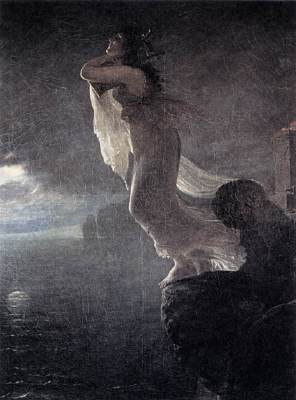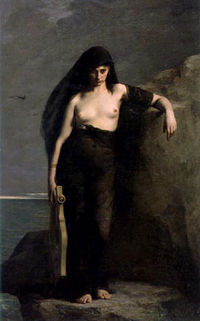 (Left) Sappho at Leucate by, Antoine-Jean Gros (b. 1771, Paris, d. 1835, Meudon) 1801 Oil on canvas, 122 x 100 cm Musée Baron Gérard, Bayeux
(Left) Sappho at Leucate by, Antoine-Jean Gros (b. 1771, Paris, d. 1835, Meudon) 1801 Oil on canvas, 122 x 100 cm Musée Baron Gérard, BayeuxThe young Gros moved his Salon audience in 1801, with his unearthly Sappho at Leucate, in which the poetess, in agonies of rejection, casts herself into the sea. Touched by the moonlight shimmering through her transparent veil, Sappho seems poised between two worlds; behind her on the cliffs stands a sacrificial altar.
Lefkada, or Leucas (Greek: Modern: Λευκάδα, Ancient/Katharevousa: -as) is a Greek island in the Ionian Sea, connected to the mainland by a long causeway and floating bridge, as well as the island's capital city.

Sappho, an artistic notion of the Greek poet by Charles-August Mengin (1877).
The myth about Sappho's suicide at Cape Lefkatas is related to other myths linking the island to the ancient Greek goddess of love, Aphrodite, and to Odysseus, the hero of Homer's Odyssey. The German archaeologist Wilhelm Dörpfeld proposed the theory that the island of Nidri off the southwest coast of Lefkada was the real historical Ithaca, home of Odysseus.
Sappho was born into an aristocratic family, which is reflected in the sophistication of her language and the sometimes rarified environments which her verses record. References to dances, festivals, religious rites, military fleets, parading armies, generals, and ladies of the ancient courts abound in her writings. She speaks of time spent in Lydia, one of the wealthiest and most powerful countries of that time. More specifically, Sappho speaks of her friends and happy times among the ladies of Sardis, capital of Lydia, once the home of Croesus and near the gold-rich lands of King Midas.
A violent coup on Lesbos, following a rebellion led by Pittacus, toppled the ruling families from power. For many years, Sappho and other members of the aristocracy, including fellow poet Alcaeus, were exiled. Her poetry speaks bitterly of the mistreatment she suffered during those years. Much of her exile was spent in Syracuse on the island of Sicily.

No comments:
Post a Comment